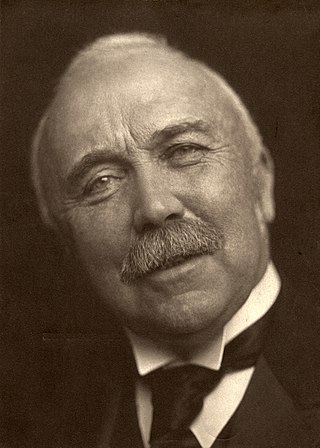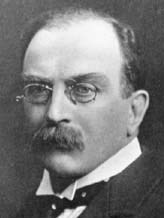Vacancy

Sir Andrew Torrance had been Liberal MP for the seat of Glasgow Central since the 1906 general election. He died on 4 February 1909 at the age of 64.
The Glasgow Central by-election was a Parliamentary by-election held on 2 March 1909. [1] The constituency returned one Member of Parliament (MP) to the House of Commons of the United Kingdom, elected by the first past the post voting system.

Sir Andrew Torrance had been Liberal MP for the seat of Glasgow Central since the 1906 general election. He died on 4 February 1909 at the age of 64.
The seat had been Liberal since they gained it in 1906;
| Party | Candidate | Votes | % | ±% | |
|---|---|---|---|---|---|
| Conservative | Charles Dickson | 7,298 | 58.5 | +10.2 | |
| Liberal | Tommy Bowles | 5,185 | 41.5 | −10.2 | |
| Majority | 2,113 | 17.0 | N/A | ||
| Turnout | 12,483 | 82.8 | −0.5 | ||
| Registered electors | 15,081 | ||||
| Conservative gain from Liberal | Swing | +10.2 | |||
| Party | Candidate | Votes | % | ±% | |
|---|---|---|---|---|---|
| Liberal | Andrew Mitchell Torrance | 6,720 | 51.7 | N/A | |
| Conservative | John George Alexander Baird | 6,289 | 48.3 | N/A | |
| Majority | 431 | 3.4 | N/A | ||
| Turnout | 13,009 | 83.3 | N/A | ||
| Registered electors | 15,616 | ||||
| Liberal gain from Conservative | Swing | N/A | |||

The local Liberal Association selected 68-year-old Tommy Bowles to defend the seat. At the 1892 general election, he was elected as Conservative Party Member of Parliament for King's Lynn and served in the House of Commons until losing his seat at the 1906 election. He was a Free trade supporter and left the Conservatives when they adopted a policy of Trade tariffs.
The Conservatives selected 59-year-old Rt Hon. Charles Dickson as their candidate. Educated at the High School of Glasgow, the University of Glasgow and the University of Edinburgh he served as the Solicitor General for Scotland from 14 May 1896 [2] to 1903 and as Lord Advocate from 1903 to 1905. He was appointed a Privy Counsellor in 1903. [3] He was Member of Parliament for Glasgow Bridgeton from 1900 to 1906 when he was defeated.
Polling Day was fixed for 2 March 1909, 26 days after the death of Torrance.
The constituency included Glasgow's business district. The Liberals concentrated on fiscal issues. The Conservatives successfully raised the Irish problem. Bowles tried to win free trade Conservative votes by qualifying his support for Home Rule, favouring it only within a United Kingdom framework. There were about 2,000 Irish in the district. The United Irish League did not give Bowles their support until 27 February. The Conservative Chief Whip apparently had some fear of Dickson 'wobbling' over tariff reform but steadied him with a warning letter. [4]
The Conservatives gained the seat;
Bowles reaction to the result: "The Irish injured me, the Unemployed deserted to the enemy and biggest and worst defection of all, the determining elector, the businessman, who last time voted against Balfour and protection, this time voted against the Government and the Budget." [5]
Bowles was re-elected for King's Lynn at the January 1910 as a Liberal. Dickson was re-elected here;
| Party | Candidate | Votes | % | ±% | |
|---|---|---|---|---|---|
| Conservative | Charles Dickson | 6,713 | 52.6 | ||
| Liberal | Alexander Murison | 6,058 | 47.4 | ||
| Majority | 655 | 5.2 | |||
| Turnout | 12,771 | ||||
| Conservative hold | Swing | ||||

The 1906 United Kingdom general election was held from 12 January to 8 February 1906.
The Barkston Ash by-election was a Parliamentary by-election held on 13 October 1905. The constituency returned one Member of Parliament (MP) to the House of Commons of the United Kingdom, elected by the first past the post voting system.
The 1904 Ashburton by-election was a parliamentary by-election held in England on 7 January 1904 to elect a new Member of Parliament (MP) for the British House of Commons constituency of Ashburton in Devon. It was triggered by the death of the sitting Liberal Party MP Charles Seale-Hayne.
The 1903 Barnard Castle by-election was a parliamentary by-election held for the British House of Commons constituency of Barnard Castle, in County Durham, on 24 July 1903.

Andrew Mitchell Torrance was a Scottish Liberal Party politician.

Sir Robert Purvis was a British barrister and Liberal Unionist politician. He sat in the House of Commons from 1895 to 1905 as the Member of Parliament (MP) for Peterborough.
The Kilmarnock Burghs by-election was a Parliamentary by-election held on 26 September 1911. It returned one Member of Parliament (MP) to the House of Commons of the United Kingdom, elected by the first past the post voting system. The constituency consisted of five parliamentary burghs: Kilmarnock in the county of Ayr, Dumbarton in the county of Dumbarton, Rutherglen in the county of Lanark and Renfrew and Port Glasgow in the county of Renfrew.
The Edinburgh East by-election was a Parliamentary by-election held on 2 February 1912. The constituency returned one Member of Parliament (MP) to the House of Commons of the United Kingdom, elected by the first past the post voting system.
The North West Norfolk by-election was a Parliamentary by-election held on 31 May 1912. The constituency returned one Member of Parliament (MP) to the House of Commons of the United Kingdom, elected by the first past the post voting system.
The Edinburgh East by-election was a Parliamentary by-election held on 16 April 1909. The constituency returned one Member of Parliament (MP) to the House of Commons of the United Kingdom, elected by the first past the post voting system.
The Chelmsford by-election was a Parliamentary by-election held on 1 December 1908. The constituency returned one Member of Parliament (MP) to the House of Commons of the United Kingdom, elected by the first past the post voting system.
The Newcastle-upon-Tyne by-election was a Parliamentary by-election held on 25 September 1908. The constituency returned two Members of Parliament (MP) to the House of Commons of the United Kingdom, elected by the first past the post voting system.
The Ayr Burghs by-election was a Parliamentary by-election held on 30 January 1904. The constituency returned one Member of Parliament (MP) to the House of Commons of the United Kingdom, elected by the first past the post voting system.
The St Andrews Burghs by-election was a Parliamentary by-election. It returned one Member of Parliament (MP) to the House of Commons of the United Kingdom, elected by the first past the post voting system.
The Manchester North West by-election was a Parliamentary by-election held on 24 April 1908. The constituency returned one Member of Parliament (MP) to the House of Commons of the United Kingdom, elected by the first past the post voting system.

The Cambridge University by-election was a Parliamentary by-election held on 11-16 February 1911. The constituency returned two Member of Parliament to the House of Commons of the United Kingdom, elected by the first past the post voting system.

The Haggerston by-election was a Parliamentary by-election held on 1 August 1908. The constituency returned one Member of Parliament (MP) to the House of Commons of the United Kingdom, elected by the first past the post voting system.
The North West Staffordshire by-election was a Parliamentary by-election held on 31 July 1907. The constituency returned one Member of Parliament (MP) to the House of Commons of the United Kingdom, elected by the first past the post voting system.
The Carlisle by-election was a Parliamentary by-election held on 14 July 1905. The constituency returned one Member of Parliament (MP) to the House of Commons of the United Kingdom, elected by the first past the post voting system.